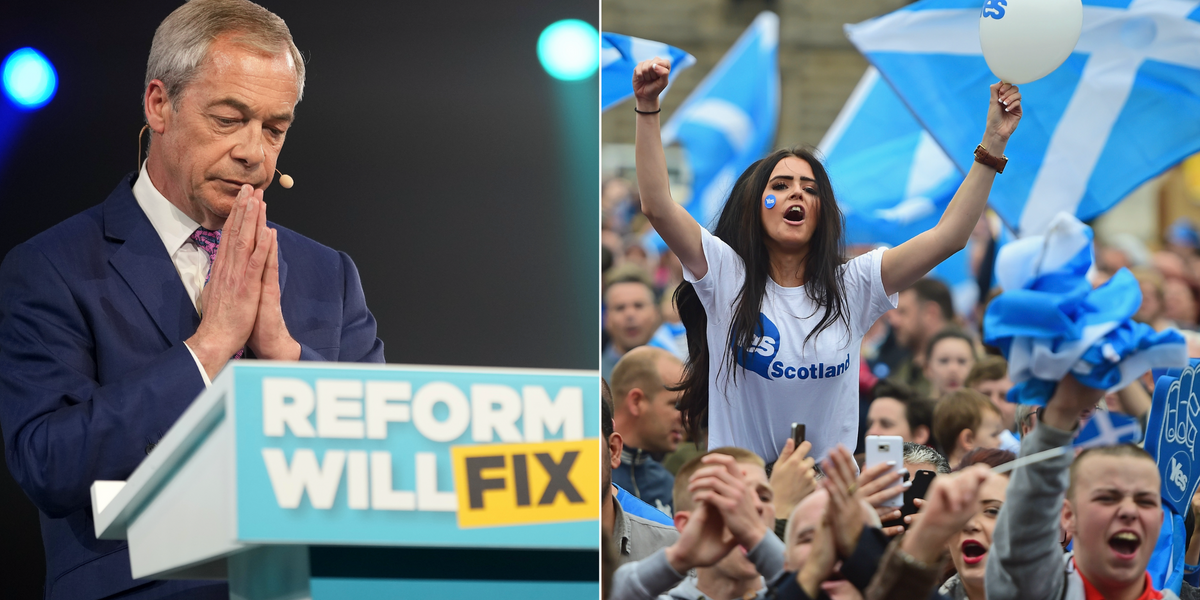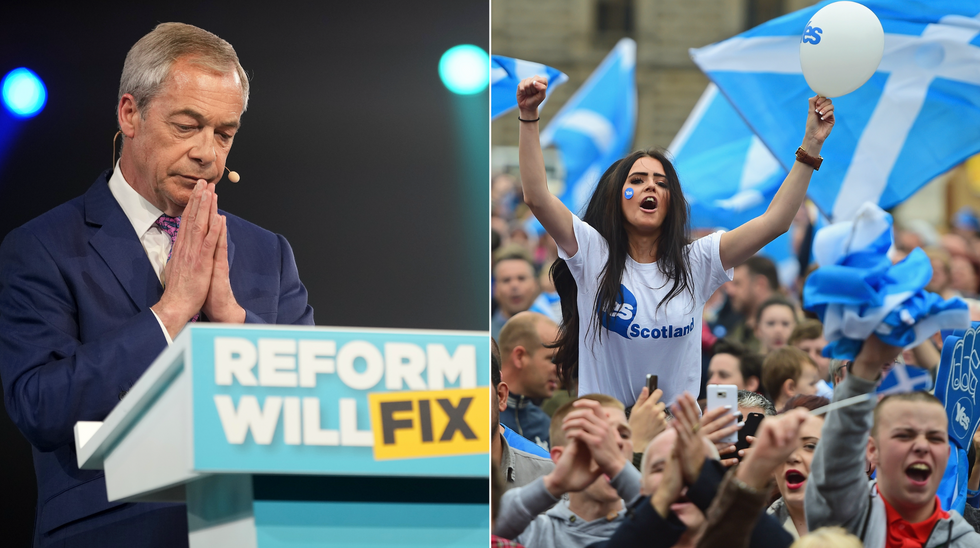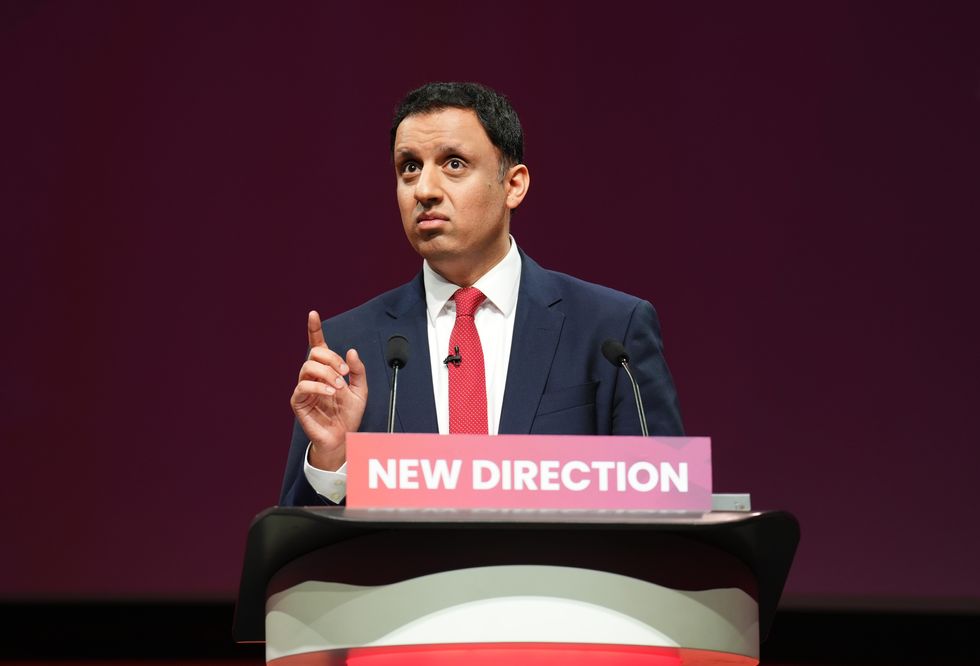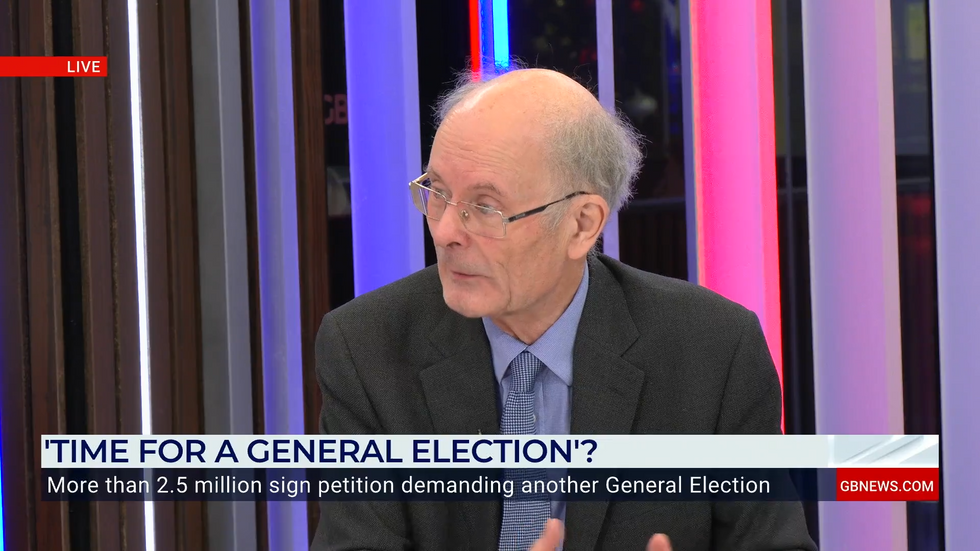



Reform's projected gains in Scotland are galvanising the independence movement, shock polling suggests.
The shock results upend the widely held notion that support for independence is dead north of the border, as evidenced by the Scottish Nationalist Party's rout on July 5 last year.
The Scottish Nationalist Party (SNP) - the vehicle for the independence movement - had been the third largest party for almost a decade before they were decimated at the ballot box, having fallen from a high of 54 seats in 2015 to just nine.
However, a new poll suggests the rise of Reform UK and frustration with Sir Keir Starmer’s Labour Government has reignited support for independence.
The survey by Norstat for The Sunday Times places support for independence at 54 per cent - the joint-highest level recorded by the polling firm to date.

How Reform's surge in Scotland could prove to be a double-edged sword that breaks up the Union
Getty Images
When undecided voters are taken out of the poll, support for independence jumps up to an eight-point lead.
However, when asked how they would vote if Farage were Prime Minister, the Yes side’s lead doubles to 16 points, with 58 per cent of Scottish voters backing independence.
Despite the threat of breaking up the Union, there are encouraging lessons Reform can draw from the SNP's meteoric rise to power, says Britain's top polling guru.
John Curtice told GB News that the SNP provides a template for destroying the two-party system.
He said: "There is no golden rule that says that third parties cannot gain seats.
"Look at the SNP in Scotland - they destroyed the traditional two-party system destroyed in 2015. Scotland shows you there is no right to left."
Conversely, a surge in Scottish nationalism could also end up propelling Reform to power if it sparks an outburst of reactionary Englishness.
It's worth noting the role devolution anxiety played in the 2015 election. The fear of a Labour tie-up with the Scottish National Party (SNP) alarmed many English voters, handing David Cameron a shock majority.
Reform could play on these same fears. Indeed, a recent analysis of voting behaviour at the last general election suggests it already is.
Professor Paul Whiteley of the University of Essex recently compared the percentage of Reform voters with those who identified as English in the 2021 census in England.
He found a strong relationship between the two measures (see chart above). The more English identifiers there are in a constituency, the greater support for Reform. In effect, Reform has become an English national party.
This rise of “Englishness” at the expense of “Britishness” over time could therefore reinforce support for Reform, Professor Paul Whiteley suggests.
Indeed, Englishness is on the rise, separate research suggests. Professor Richard Wyn Jones of Cardiff University’s Wales Governance Centre and Professor Ailsa Henderson of the University of Edinburgh spent 10 years exploring political attitudes in England through their Future of England Survey, the most detailed study of attitudes in England towards national identity and constitutional change.
The nine big quantitative surveys of “Englishness” they have conducted since 2011 demonstrate that the number of people who describe themselves as exclusively or mainly English rather than British is growing, and that the notion of “Britishness”— is splintering.
<img data-id="fixed-image" src="https://www.gbnews.com/media-library/chart-showing-reform-uk-stands-to-benefit-from-the-rise-in-englishness-data-suggests.png?id=60352071&width=980" alt="Chart showing Reform UK stands to benefit from the rise in " englishness",="" data="" suggests"="" width="100%" height="auto">
Reform UK benefitting from the rise in "Englishness"
Getty Images/ P Whiteley, CC
 Anas SarwarPA
Anas SarwarPA
The polling also shows a boost for First Minister John Swinney, as he has the highest approval rating of all the Scottish party leaders, although he still has a net negative.
According to the survey, three in ten Scots endorse Swinney’s job performance, compared with 37 per cent who think he is performing poorly, an approval rating of minus seven.
Scottish Labour leader Anas Sarwar is on minus 25, only one point ahead of Farage. Leader of the Scottish Conservatives, Russell Findlay, was on minus 32, Starmer is on minus 39, and national Tory leader Kemi Badenoch is on minus 44.
It comes as voters in Hamilton, Larkhall & Stonehouse will go to the polls later this week for a key Holyrood by-election following the death of SNP veteran Christina McKelvie after her battle with breast cancer.
The SNP, Reform and Scottish Labour have butted heads over the vote.

Sir John Curtice has said Reform can follow the SNP lead
GB NewsFirst Minister Swinney took aim at Farage this week, saying: "Be in no doubt, Nigel Farage doesn’t care about Scotland. He poses a threat to our values and must be stopped, and only the SNP can do that."
Earlier this week, Swinney said: "I want to make sure the SNP wins the two-horse race in the Hamilton, Larkhall and Stonehouse by-election. It’s crystal clear to me, the Labour campaign is collapsing and only votes for the SNP will stop Farage."
Responding to Swinney's claims, Farage said: "The more they insult me, the more I know we must be doing something right. I think they're in a blind state of panic. They're chucking around all sorts of insults. I thought the First Minister yesterday was, quite frankly, inciteful."
Meanwhile, Sarwar said: "It’s between ourselves and the SNP, every single vote is going to count.
"That’s why, if you want to beat the SNP, if you want a local champion, if you want to start that pathway to a new direction, the best way of doing that is to vote for one of your own – vote for Davy Russell."
